ABSTRACT:
In the immensely complicated business environments and hyper-competitive market landscapes, ‘expertise,’ ‘innovation,’ ‘cost control,’ and ‘exceptional customer services’ are the key differentiating factors that make companies stand apart from their competitors. However, gaining mastery of all core and non-core business processes and handling all operations with in-house teams can be challenging for many organizations. From Fortune 500s to startups, businesses of all types, sizes, and verticals liaise with third parties to outsource their specific operational activities and business processes.
Currently, the Business Process Outsourcing (BPO) industry is surging high with consistent market growth, optimism, and excellence achieved in innovative technologies. Outsourcing business processes brings multiple benefits, including cost-efficiency, expertise, scalability, faster turnaround times, improved customer experiences, and increased productivity. Business process outsourcing is tantamount to envisioning a shared future by two organizations. However, there are also concerns regarding data security, trust, control, and legal issues.
Goodfirms’ current survey is on BPO. This research, “Business Process Outsourcing - Purpose, Market, and Future Scope,” is an attempt to gauge the current state of the business process outsourcing industry, its major types, the most outsourced business functions, the purpose of outsourcing, and future scope. The survey also aims to identify the challenges that organizations face while outsourcing their business processes.
Table of Contents:
Introduction
Survey and Data Analysis
Current State of Outsourcing
Top Outsourced Business Functions and Services
Key Reasons for Outsourcing Business Services
Top Factors in Choosing a Particular Service Provider
Benefits Organizations Have Achieved after Outsourcing their Business Processes
Major Concerns in Outsourcing Business Processes
Current Trends in the Business Process Outsourcing Field
The Future of Business Process Outsourcing
Cost Will No longer Be the Differentiator
Key Findings
Conclusion
References
Introduction
Outsourcing has a long history that traces back to the time when the US industries began to outsource specific aspects of their operations during the Industrial Revolution of the 18th century. Outsourcing revolutionized the way factories functioned and acquired labor and raw materials. As a result of this transformation, American factories were no longer constrained by their physical location. Later, with better connectivity around the world, telemarketing and telesales were added to the list of most outsourced business activities. Outsourcing has since evolved to become highly varied and marked by more intelligent service providers and increased automation. The industry is also witnessing the rise of better-informed customers who aim for outsourcing agreements that are sustainable and long-lasting.
Goodfirms survey titled: "Business Process Outsourcing - Purpose, Market, and Future Scope." aims to understand the current state of the BPO industry, the reasons behind outsourcing business functions, top outsourced business activities, the benefits of outsourcing, and its potential in the future. The survey also reveals a few emerging trends in the global outsourcing markets, along with examining the concerns companies have while outsourcing their business processes.
Survey and Data Analysis
Current State of Outsourcing
The outsourcing industry has experienced significant growth and transformation over the past few years. The industry is growing and evolving, with businesses increasingly adopting outsourcing to reduce costs, improve efficiency, and leverage specialized expertise. The global business process outsourcing market is expected to expand at a compound annual growth rate of 9.4% from 2023 to 2030 to reach USD 525.2 billion by 2030.(1) The COVID-19 pandemic accelerated the adoption of outsourcing, with many businesses seeking to reduce costs due to the recent setbacks.
Goodfirms survey revealed that 55.6% of businesses outsource their business processes while 18.5% of surveyed organizations are in the initiating stage.
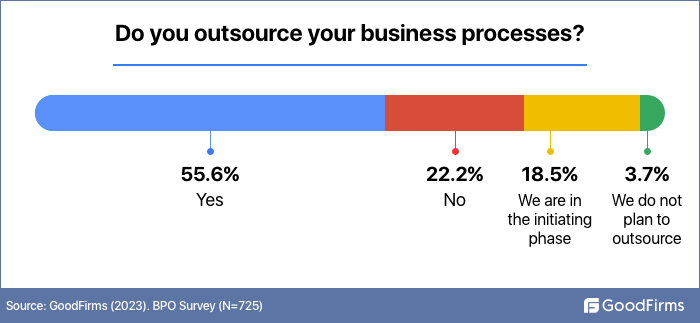
For many, outsourcing allows focus on their core competencies and strategic priorities. By outsourcing non-core activities, businesses free up internal resources to focus on their core business functions. Others ensure compliance with legal and regulatory requirements by outsourcing to agencies with better infrastructure, talent pool, and expertise.
|
From achieving cost savings, improving efficiencies, enhancing scalability, and mitigating supply chain risks to leveraging economies of scale and gaining access to specialized services, there are multiple reasons why businesses choose to outsource their business functions.
|
Shift from Traditional Single Source Outsourcing Models to Modern Multisource (collaborative) Models
To remain competitive and cater to the changing requirements of businesses, the industry is also embracing new technologies and adapting newer business models. The traditional single-source outsourcing models that involved outsourcing a particular business function to a single service provider are being replaced by newer multisource models with greater collaboration between multiple service providers.(2)
The shift towards multisourcing models has also compelled businesses to prioritize collaboration to successfully manage the relationships between multiple service providers. For example, in a co-sourcing arrangement, multiple providers may need to work together to ensure that compliance requirements are met, data is protected, and service levels are maintained.
Outsourcing has matured beyond its traditional focus on cost reduction to become a strategic tool(3)
While cost savings is a noteworthy benefit of business process outsourcing, it is not the only reason why businesses choose to outsource. For example, Apple’s iPods are designed in California (4) but assembled in China, Vietnam, and India via its outsourcing partners. Apple not only outsources the assembling of iPods to these countries but also deals with companies that have unique intellectual properties in packaging technologies. Businesses today outsource to access a broader pool of talent and capabilities, gain flexibility in terms of scaling operations, and drive innovation by leveraging new technologies sourced from outsourcing partners.
Outsourcing companies get paid for the productivity and transformation they bring
In the past, outsourcing was a simple process where companies would delegate basic tasks to external providers in exchange for payment based on a standard rate for their ‘time’. However, a new approach to outsourcing is emerging where providers are responsible for implementing digital solutions to transform clients’ operations and are compensated based on the ‘results’ they achieve, the productivity they unleash, and the technology they utilize, such as robotic process automation, natural language processing, or AI. This new model is more complex and involves more intricate processes than traditional outsourcing.(5)
Outsourcing has evolved from handling basic data entry to complex data analytics
For years, companies have been outsourcing data entry and management tasks, but contemporary demands and corporate expectations now include data analysis and insights as critical components of outsourcing. In the past, privacy regulations and security concerns prevented businesses from seeking external partners for their data analytics needs.(6) However, today, even third-party providers have robust cybersecurity and data protection measures at their end, and the current necessity for strategic and effective data management is at an all-time high, leading organizations to turn to third-party providers for data analytics needs.
The global market for business process outsourcing (BPO) is mainly divided into three categories based on the type of outsourcing: offshore, nearshore, and onshore.
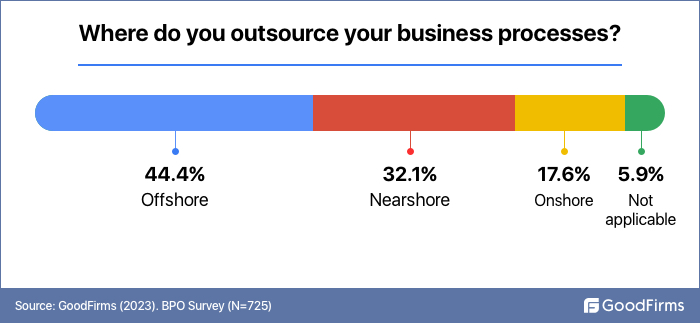
Offshoring
44.4% of surveyed businesses reported offshoring their business processes
Offshoring refers to outsourcing business activities outside one’s registered country. When businesses choose an outside country rather than the one where their primary operations are based for outsourcing needs, it is called offshoring. offshoring is still the top choice for outsourcing, as revealed by our survey. However, organizations that offshore have to deal with current challenges related to complex logistics, increasing socio-political disruptions, and pandemic-led policy changes in many countries.
Nearshoring
32.1% of surveyed businesses reported nearshoring their business processes
Nearshoring is a type of offshoring but only to a nearby country. When businesses outsource their processes to firms located in neighboring countries that generally share a border with them, it is called as nearshoring. For companies seeking to improve their operational efficiency while avoiding the difficulties of conventional offshoring (logistics issues, cultural differences, etc.) nearshoring represents a perfect alternative to outsourcing their operations.
“More companies are choosing to outsource to nearby countries to mitigate cultural and communication barriers while still enjoying cost advantages,” says Michael Chen, Growth Director, Notta AI.
When compared to offshoring, nearshoring has several advantages, such as minimal time zone differences and cultural disparities and quick and cost-effective travel.
Onshoring
17.6% of surveyees reported onshoring their business processes
The opposite of offshoring is onshoring, which involves relocating business processes to a lower-cost location within a country's borders. Often, these functions and processes are moved to a nearby location, particularly when working with larger clients who require close proximity. Onshoring offers cost savings and flexibility to organizations, as well as more efficient and effective coordination and communication.
Top Outsourced Business Functions and Services
Goodfirms' research found that the top 5 outsourced business functions are accounting, marketing, IT management, human resources, and customer services.
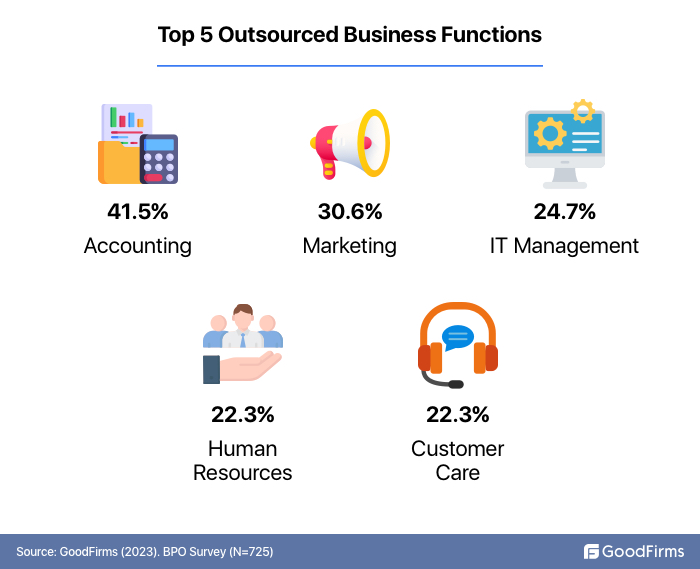
Accounting
41.5% of surveyed businesses stated they outsource their accounting requirements
Most companies do not have an internal accountant who is well-versed in all aspects of the accounting process, including bookkeeping, taxation, financial compliance, etc. Even if companies hire accountants to update their account books on a daily basis or make payrolls etc., they generally hire accounting and audit firms or professional accountants to finalize their annual accounting processes. Also, for compliance purposes, organizations rely on external agencies that specialize in business accounting. It reduces errors, ensures double-checking of accounting records, and aids internal accountants in areas where they do not have expertise.
|
Accounting emerged as one of the topmost outsourced business functions, with every 4 out of 10 businesses surveyed by Goodfirms confirming outsourcing their accounting processes.
|
Marketing
30.6% of surveyees outsource their marketing needs
Around one-third of the surveyed businesses pointed out that content marketing and digital marketing requirements are overwhelming for them. With multiple web assets to manage, including websites, social media pages, third-party profiles, online video content, etc., businesses find it difficult to manage all on their own. Also, social media marketing and content marketing trends are very dynamic and, therefore, require frequent modifications in campaigns, strategy, and content. Having seasoned professionals handling online marketing needs is a prudent solution.
|
Goodfirms survey found that while most traditional marketing processes are still handled by in-house teams, niche, and online marketing requirements are outsourced.
|
IT Management
24.7% of surveyed businesses have outsourced their IT management needs
IT functions, including managing IT assets (software, hardware, and networks), sourcing business applications, handling day-to-day glitches in workstations, etc., can be overwhelming for small businesses with no separate IT department to handle all this. The situation gets more tricky if businesses have to also provide IT support to their customers. For instance, a customer calls to report he/she is not able to click on a ‘proceed payment button’ on the payment page.
|
Near one-fourth of our surveyees have opted for managed IT services offered by third-party providers to handle such cases and maintain their IT infrastructure.
|
Human Resources
22.3% of surveyed businesses have liaisons with RPO service providers for their human resource requirements
Talent acquisition lifecycles are complicated. From talent sourcing, administration, and screening, to assessment, onboarding, and retention, the multiple stages of the recruitment processes may overwhelm organizations. The problem is more critical for businesses with diversified human resources requirements. Organizations may also need help regarding labor laws compliance. Recruitment Process Outsourcing (RPO) service providers that provide full, project-based, or on-demand service are generally hired as a holistic hiring solution.
|
Around one-fifth of our surveyed respondents agreed that they have outsourced their human resources requirements, particularly the recruitment process, to RPO service providers.
|
Customer Care
19.2% of surveyed businesses have outsourced their customer service department
Great customer service is the hallmark of thriving and healthy businesses. Sometimes internal customer support teams may hit bottlenecks in handling support tickets, especially in times of crisis or unexpected incidents. There are times when AI chatbots may not work, and businesses may be overwhelmed by incessant inquiries on customer service desks. Businesses with small teams are worst hit by such occurrences. Also, there are few businesses and sectors, such as telecom, travel, logistics, banking, e-commerce, etc., that require more after-sales customer service than others. All such businesses generally opt for hiring external customer service specialists.
|
Almost one out of every five surveyed businesses by Goodfirms has partnered with customer support providers and outsourced their customer service requirements.
|
Apart from the above top five outsourced business functions, lead generation, software development, data analysis, and legal functions are the other most outsourced business activities, as revealed by Goodfirms’ survey.
Key Reasons for Outsourcing Business Services
There are many reasons why companies choose to outsource and seek a partnership outside their premise. Outsourcing partnerships can act as a bulwark against hyper-competition, technological disruptions, and skill deficiencies.
“Where outsourcing is in the partnership mold, this can defend an organization against disruption. Good partnerships are bilateral, and by fostering close collaboration, the supplier is empowered to innovate on behalf of the client, says Mark Schwartz, the Enterprise Strategist at Amazon Web Services.(7)
Goodfirms surveyed businesses to find key reasons for their outsourcing endeavors. Below are the findings:
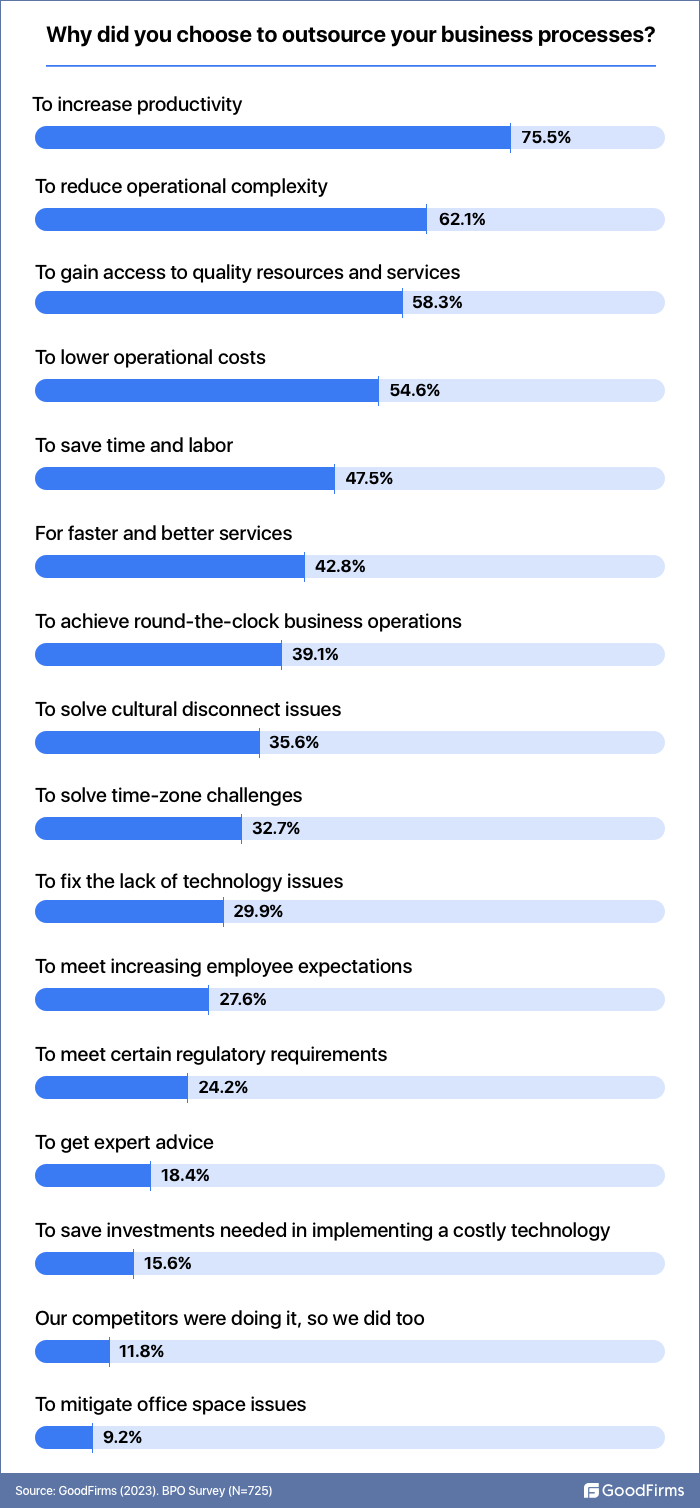
75.5% of surveyees choose to outsource business services to increase productivity
Outsourcing business services is a popular strategy to increase productivity. By hiring external companies to perform specific business functions, businesses allot work to providers with specialized skills and expertise.
Many surveyed businesses commonly delegate non-essential aspects of their everyday operations to outside contractors. These delegated functions are usually those that are excessively time-consuming or monotonous, such as advertising, hiring, data entries, accounting, etc. By outsourcing these activities, in-house staff members can concentrate on more critical duties, such as developing products, maintaining client relationships, and other essential tasks.
62.1% of businesses outsource their business functions to reduce operational complexity
Operational complexities can overwhelm even the most seasoned businesses. For instance, multiple functions associated with supply chains, such as managing the procurement, transportation, storage of raw materials, inventory management, coordinating with suppliers, logistics providers, and retailers, etc., increase operational complexities.
Therefore, outsourcing business services has increasingly become a popular strategic move for companies aiming to reduce operational complexity. By entrusting specialized tasks to external experts, organizations can focus on their core competencies while ensuring that essential processes are executed efficiently.
58.3% of businesses outsource to gain access to quality resources and services
Outsourcing not only streamlines the management of day-to-day operations but also allows companies to tap into a vast pool of expertise and valuable resources that they may not have in-house.
For instance, when software development is outsourced, businesses can access cutting-edge technology, advanced development tools, and expertise that will lead them to deploy superior software apps for their business than the ones they try to create in-house. Expert vendors or contractors can supply the essential know-how, expertise, and equipment to finish software projects with greater efficiency and efficacy.
54.6% of surveyed organizations outsource to reduce operational costs
The primary incentive for a business to engage in outsourcing is to reduce expenses. In the corporate world, workforce expenses often constitute a considerable portion of overhead costs. Recruitment, employee verification, training, and onboarding processes are time-consuming and costly.
Delegating tasks to external providers enables companies to acquire specialized abilities and knowledge without the need for hiring workers or training in-house workers. This leads to decreased workforce expenses, diminished costs related to machinery, and no expenditure for extra workspaces. If a business chooses to handle all aspects of its operations internally, it also incurs significant expenses related to research, marketing, development, and distribution. However, by outsourcing certain functions to third-party contractors, businesses can reduce their costs while still providing efficient service.
47.5% of businesses outsource to save time and labor
One of the toughest obstacles that businesses face when hiring new employees is the rise in labor expenses. However, by outsourcing tasks to other companies, businesses have the opportunity to eliminate labor costs and also assign time-consuming and unimportant duties to external providers. Also, it is not always wise to increase internal teams for repetitive work. An increased team may cause the Ringelmann Effect(8) and lead to unproductive sessions. By delegating repetitive tasks outside, companies may curtail the expenses involved in hiring more people.
42.8% of businesses stated they choose to outsource to get faster and better services
Outsourcing can often provide faster and better services for businesses. Specialized contractors with experience can complete tasks more quickly and efficiently, ultimately not only leading to a better time to market but also reducing overall business expenses. Furthermore, these experts are less likely to make mistakes than a less experienced in-house employee. For example, outsourcing to RPO (Recruitment Process Outsourcing) providers can improve hiring efficiency, resulting in faster and better services.
39.1% of surveyees achieve round-the-clock business operations
Outsourcing to a company with different working hours ensures that the business can provide round-the-clock services to customers while preventing staff burnout due to long working hours. For instance, by outsourcing customer support, companies can offer round-the-clock service to their clients, ensuring that their inquiries are addressed at any time of the day or night. Providing 24/7 customer service enhances the customer experience and gives the company an edge over its rivals in the industry.
35.6% of surveyed businesses go for outsourcing to solve cultural disconnect issues when dealing with overseas businesses
When businesses deal with overseas clients, there can be cultural differences that can cause various friction points and miscommunication scenarios. This is where outsourcing comes in as a solution to solve cultural disconnect issues. By outsourcing to a company that has a better understanding of the cultural nuances of the country of the clients, businesses can build positive relationships with their overseas partners.
32.7% of surveyed businesses outsource to solve time-zone challenges
When businesses provide services to clients in other countries with different time zone, then they need to hire employees that can work in the time zones of their clients. However, it is often difficult to hire employees for odd working hours or night shifts. Outsourcing the same can help businesses manage overseas clients without having to hire employees in their own country. This solves the time-zone problem and ensures the service available during the normal working hours of their clients.
29.9% of surveyed businesses outsource their business processes to fix the lack of technology issues
Many companies may not possess a key piece of technology required to complete any particular business function. However, the technology may require particular expertise in the given field. Adopting it in-house may not seem like a prudent solution. In such cases, businesses generally outsource that particular process to special category companies that possess the necessary technology.
For instance, most automotive manufacturers do not possess the technology to produce semiconductor chips that are used in cars. Making semiconductors requires an altogether different set of equipment and niche technology. Therefore, automotive makers generally outsource their chip requirements to experts.
27.6% reported outsourcing to meet increasing employee expectations
27.6% of surveyed businesses choose to outsource to meet increasing employee expectations by leveraging the expertise and resources of specialized providers to offer better employee benefits and services and also reduce their workloads. For example, a business may outsource its training and development to an external provider for better professional development certifications, courses, and skill enhancement. Also, by hiring outsourcing providers to meet the frequent surge in demand, businesses can reduce the extra burden on their employees.
24.2% outsource to meet certain regulatory requirements
About 2 out of 10 surveyed businesses choose to outsource to meet regulatory requirements. Outsourcing can provide access to specialized expertise and resources that can help businesses comply with complex and evolving regulatory requirements.
For instance, strict adherence to patient data privacy regulations and other guidelines issued by Health Insurance Portability and Accountability Act (HIPAA) is mandatory for businesses operating in the healthcare industry. By outsourcing their patient data management to providers that specialize in HIPAA compliance, businesses can ensure that their data management practices are in compliance with the regulations.
18.4% of businesses outsource their functions to get expert advice
Outsourcing can help businesses gain deep insights for better decision-making from experts.
For example, a business may not understand the nuances of cybersecurity and IT security compliances. Outsourcing can provide businesses with services such as cyber security risk assessments, threat monitoring, vulnerability testing, incident response planning, etc. Similarly, by hiring digital marketing experts, a business may get the best advice and services for social media marketing, search engine optimization, content marketing, etc.
15.6% of surveyees stated they outsource to save investments needed in implementing a costly technology
Some technologies are very expensive and may require a huge investment. Businesses may choose to outsource to save investments needed in implementing a costly technology and subsequent investments in ongoing maintenance expenses by hiring an outsourcing partner that has the technology.
11.8% of businesses outsource as their competitors are doing it also
Businesses may choose to outsource business functions because their competitors are doing it as a way to remain competitive and keep up with industry trends. For example, most businesses in the solar panel industry outsource their aluminum frame requirements. A business in the solar panel manufacturing industry may choose to outsource its aluminum frame requirement to keep up with its competitors.
9.2% choose to outsource to mitigate office space issues
A business may face a limited office space scenario due to rapid growth and may need to expand its operations without incurring more expenses on office space. By outsourcing some of its functions, such as customer service or accounting, to a provider's premises, the business can free up valuable office space and reduce its overhead costs.
Top Factors in Choosing a Particular Service Provider
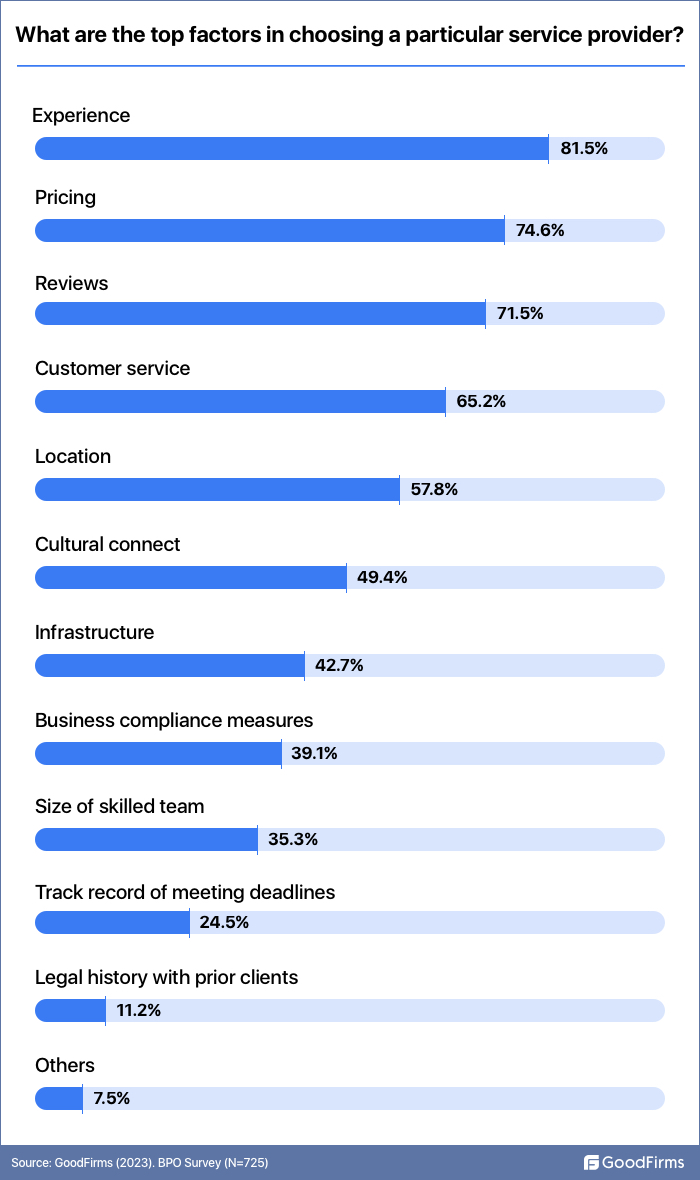
81.5% of businesses consider the experience of the outsourcing service provider before selecting one
A proven track record of delivering high-quality services with vast experience is a critical factor in determining an outsourcing service provider’s ability and competencies. Surveyed businesses review the provider's client experience, work history, and testimonials to evaluate their abilities. The management team, project managers, and other team members should also possess exceptional qualifications and extensive experience in executing business projects.
74.6% of businesses consider pricing before finalizing outsourcing service partners
Pricing is an important factor that determines the profitability of outsourcing endeavors. Businesses surveyed by Goodfirms reported checking pricing structures, quotes, and pricing models like per-hour rates, subscriptions, consumption-based pricing, fixed-fee arrangements, commission-based rates, etc., before finalizing their outsourcing partner. Businesses also consider hidden costs, tax requirements, etc., to make outsourcing decisions.
Evaluating costs accurately is critical for successful outsourcing outcomes. Without proper evaluation of costs, outsourcing can be disastrous.
For instance, In 2007, IBM was given a contract by the Queensland health department to create a payroll system application. Initially, IBM estimated that the project would cost $6 million, but soon discovered that it was much more complex and difficult than they had anticipated. By mid-2008, IBM announced that the project would cost around $27 million. However, the project faced delays and ended up costing 16,000% more than the original estimate, amounting to $1.2 billion.(9) Unfortunately, the system never worked as intended.
Businesses must put sufficient clauses (related to incentives, penalties, and price monitoring) in their agreements to restrict vendor’s opportunism. Businesses can use theories such as Transaction Cost Economics (TCE) by Barthélemy and Quelin to safeguard them against pricing disasters.(10) The TCE model can also be used to decide which functions should be outsourced and which ones should be kept in-house.
When evaluating outsourcing, it is crucial to take into account all associated costs and benefits. This includes both direct and indirect costs, such as transition expenses and ongoing operational costs.
71.5% of businesses read reviews before choosing an outsourcing service provider
More than 70% of businesses surveyed by Goodfirms asserted they read reviews before choosing an outsourcing service provider. Reviews can provide valuable insights into the reputation, work ethics, delivery, commitment, customer experience, and reliability of the outsourcing provider. Respondents mentioned that they read reviews on trusted third-party websites such as Google, Yelp, Trust Pilot, Glassdoor, Goodfirms, etc., to select their BPO service provider.
65.2% of businesses evaluate customer service before finalizing a BPO service provider
Assessing the customer service performance of a provider is crucial to ensure that businesses will receive the necessary attention and prioritized support. This evaluation helps businesses partner with service providers who prioritize delivering excellent services to their clients. Surveyed businesses reported evaluating customer service before finalizing BPO service providers with key emphasis on factors like responsiveness, resolution time, escalation ratio, customer churn ratio, existing client satisfaction with customer service, etc.
57.8% of businesses consider the location of the BPO service provider before hiring them
Businesses consider the location of outsourcing service providers before hiring them because location can impact factors such as supply chain, time zone-related issues, availability of infrastructure, labor resources, cultural compatibility, costs, business environment, etc. For example, hiring a local outsourcing partner from the country where a business conducts its operations can result in better customer satisfaction and smooth communication, as the outsourcing partner will be well-versed in the local culture, language, and market.
Moreover, certain countries have lower labor costs than others, which is a factor to consider for businesses seeking to reduce expenses.
Also, keeping in mind the geopolitical situation in the country of the outsourcing service provider minimizes risk exposure of any major investments. In countries with unstable, uncertain, and tense geopolitical situations, there are more chances of sudden and significant disruptions of business operations.
49.4% of surveyed organizations named cultural connect as their prime consideration before selecting their outsourcing partner
When companies outsource their corporate procedures to a service provider located in another country, they may face cultural (differences in cultural norms, customs, work ethics, business practices, etc.) and linguistic barriers (differences in language causing communication breakdown, misinterpretation of instructions, etc.) that can create challenges decision-making and affect the quality of the outsourced service.
"Cultural and linguistic barriers are, in my opinion, one of the biggest obstacles to overcome when outsourcing corporate procedures. When a company uses a service provider located in another country, they are engaging in offshore outsourcing. Communication, decision-making, and the quality of the outsourced service can all suffer when language and cultural barriers are present," says Jamie Irwin, Digital Marketing Expert, TutorCruncher.
Therefore, nearly half of our surveyees reported evaluating cultural connect before selecting their vendors.
42.7% consider the Infrastructure of the BPO provider before selecting one
Significant technological facilities, networks, systems, and resources are required to support the delivery of BPO services. Goodfirms survey found that BPO providers with modernized systems, such as those using robotic process automation, high-speed internet, and cloud computing, are preferred. Industry-grade Infrastructure ensures the overall success of the outsourcing partnership.
By hiring an outsourcing partner that employs advanced software tools and equipment, businesses can improve their efficiency and productivity. These solutions are an effective means of promoting seamless communication and collaboration. Therefore, businesses consider the infrastructure of the BPO provider before hiring them.
39.1% of surveyees check business compliance measures before hiring any outsourcing partner
Outsourcing certain business processes may involve providing sensitive data to the outsourcing partner. Therefore, ensuring that the outsourcing partner is compliant with all relevant regulations and standards is essential for reducing compliance risks. Businesses check data protection compliances such as GDPR, and HIPAA, financial regulation compliances such as PCI DSS, labor law compliance such as OSHA, and environmental compliances before hiring an outsourcing partner.
35.3% of businesses named the size of the skilled team before liaising with any outsourcing service provider
The size of the skilled team determines the overall expertise and resources a business will get from its outsourcing partner. It also ensures scalability and timely delivery of projects. A large and skilled team is more flexible, agile, and diverse. Outsourcing to a provider with a large skilled team can help businesses keep pace with the increasing operational complexities and recurrent demands for expansions. A large team can handle more projects, provide better customer service, and attend to any urgent requirement of its clients.
24.5% of businesses check the track record of meeting deadlines of their outsourcing service partner
Missing deadlines can cause project delays, cost overruns, reputational loss, and poor customer disappointment scenarios. Businesses that rely on third-party vendors or outsourcing partners to deliver projects or service clients can suffer huge setbacks if deadlines are not met. Therefore, checking the track record of meeting deadlines is critical before hiring an outsourcing partner. Companies with a strong track record of meeting deadlines generally have better processes and effective resource management in place.
11.2% of surveyed organizations evaluate the legal history with prior clients of the outsourcing partner before hiring them
Organizations consider the legal history with prior clients of the outsourcing partner before hiring them to identify any potential legal risks associated with entering into a partnership with them. Past disputes, contractual breaches, legal suits, etc., provide a glance into the practices, ethics, and professionalism of the BPO provider.
7.5% of surveyees named other factors like risks involved, references, portfolio, etc.
Without risk analysis, it is never wise to hand over a crucial process of business operation to a third party. For instance, Navitaire, the e-commerce platform for airlines, supplied Virgin Airlines with a Software-as-a-Service (SaaS) system that provided booking, reservation, check-in, and boarding services. The SaaS system experienced two crashes within a three-month period. As per their agreement, Navitaire was responsible for addressing critical system failures as quickly as possible. However, on this occasion, they were unable to fix the issue promptly, taking almost 24 hours to do so. As a result, all Virgin Airlines flights were suspended, and more than 50,000 passengers were left feeling dissatisfied.(11) Thus, risks involved in outsourcing should be contemplated carefully before hiring outsourcing partners.
Businesses also mentioned assessing factors like references, portfolio, trust scores, etc., to determine the overall authenticity, reliability, and skill set of the provider. These factors also help them evaluate the trustworthiness and quality of service provided by the BPO.
"With so many platforms to hire outsourced talent, the market's become saturated. It's hard to know if you can trust who you're outsourcing to. To mitigate this risk, it's worthwhile paying a bit more for someone who has a strong track record, reputable references, and a portfolio. Spending a bit more to hire the right person can save you so much overhead down the line," says Kevin Li, Growth Marketer, NextWork.
Benefits Organizations Have Achieved after Outsourcing their Business Processes
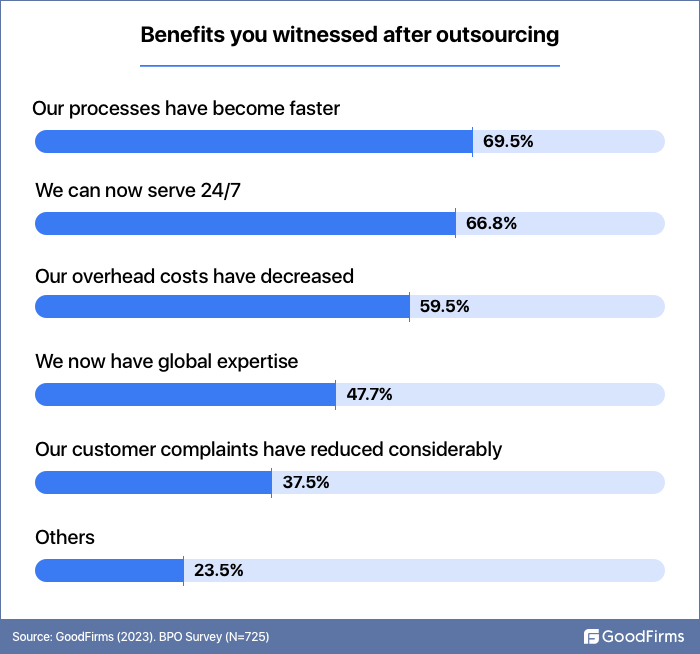
69.5% of surveyed businesses mentioned their processes have become faster after outsourcing
Many companies struggle to meet the unexpectedly high demand for their products or services. Without proper staffing levels, the mismatch in demand and supply can lead to poor quality outcomes and substandard services. Outsourcing certain tasks can be a valuable way to boost workflow efficiency, allowing businesses to focus on their core strengths while delegating other areas to external experts.
By outsourcing certain tasks, employees can concentrate on their areas of expertise, ultimately leading to improved efficiency and faster processes. When properly implemented and wisely executed, outsourcing can significantly improve overall results for companies.
66.8% of surveyed organizations say they can now serve 24/7
Business functions such as customer service and help desks do require round-the-clock availability. As most BPO companies operate 24/7 and even if not 24/7, they handle the next shift when the local shift closes operations. For example, while the local team is closing operations, the offshore team can start their workday. Outsourcing can enable organizations to serve their customers 24/7 by leveraging time zone differences and the availability of skilled professionals in different regions.
59.5% of surveyed businesses assert their overhead costs have decreased
One of the biggest expenditures for businesses is their workforce-related spending. Salaries, recruitment expenses, employee insurance, IT equipment, software purchases for teams, user licenses, training, and development costs, etc., are expensive overheads. To save costs, businesses usually cut down on overhead expenses and outsource services to specialized suppliers who charge less owing to their economies of scale.
Small business owners, in particular, can benefit from outsourcing as it relieves them of the financial burden associated with employee expenses and office space.
47.7% of respondents assert gaining expertise global expertise
Due to the shortage of workforce, companies are facing tough competition in the market for skilled labor. Outsourcing grants companies access to global talent in the required niche. Many organizations find global talent acquisition highly challenging in the current times, especially since there is a dearth of skilled candidates in the field of cybersecurity, data science, machine learning, software development, etc.
37.5% of organizations reported a considerable reduction in their customer complaints owing to outsourcing
Outsourcing helps organizations improve the quality of their customer service and reduce the number of customer complaints by providing access to skilled professionals who can handle customer inquiries and issues more effectively than in-house teams. For example, a hospital that outsources its claims processing to a healthcare BPO can decrease its customer complaints significantly. The healthcare BPO will deal with the complex processes with more precision and expedite workflows reducing delays in claim processing.
23.5% of survey respondents mentioned operating model resilience, improved employee morale and reduced burden, more flexible solutions, and custom technology as the benefits they are gaining from outsourcing their business processes.
Major Concerns in Outsourcing Business Processes
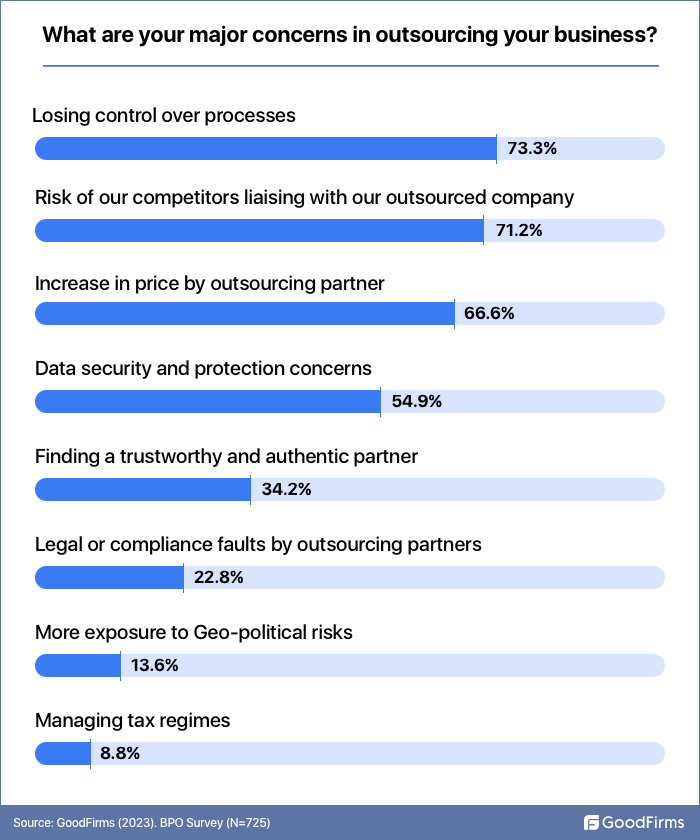
73.3% of surveyees are concerned about losing control over business processes
The survey finding highlights the fear that many businesses have about outsourcing - the idea of turning over responsibility for important processes to a third-party service provider can be scary, particularly because of the potential risks involved.
“Outsourcing may result in reduced control over certain business functions, which can affect overall quality, efficiency, and responsiveness,” says Ada Scott, Marketing Manager, EaseUS.
For example, trusting a third-party provider for managing your cybersecurity. If anything goes wrong, it can have catastrophic consequences for the business.
To address this concern, it is important for businesses to carefully consider which processes or functions they choose to outsource. It is crucial to identify the activities that are business-specific and differentiate them from those that are non-core and non-differentiating. Outsourcing core competencies can blow away uniqueness, and companies may lose their competitive advantage.
Therefore, by retaining core functions in-house, businesses can protect their strategic objectives while leveraging the expertise of external providers for other functions.
71.2% have concerns related to their competitors liaising with their outsourcing partner
Businesses may have concerns related to their competitors liaising with their outsourcing partners, as this could potentially lead to the loss of trade secrets, intellectual property, or other confidential information if their competitors somehow manage an unethical liaison with their outsourcing partners.
However, to address this issue, businesses can take certain steps, like requiring the signing of a non-disclosure agreement by their outsourcing service provider, conducting periodic audits, reviewing security logs, monitoring sensitive activities and data regularly, etc. Businesses should also check and verify references before hiring outsourcing partners, review their security policies and practices, and verify compliance with outsourcing providers.
66.6% of surveyed businesses reported a sudden increase in prices by an outsourcing partner as a major concern in outsourcing
A sudden increase in prices by an outsourcing partner can be a major concern for businesses that rely on outsourcing to deliver cost-effective services. Changes in market conditions, inflation, or increased demand for outsourced services, can inverse an outsourcing service provider’s ability to provide services at the current cost and may force it to increase its prices. However, this can adversely impact the current budget of the businesses that have outsourced their services at variable pricing structures.
To mitigate this risk, businesses should include clauses related to ‘pricing’ in their outsourcing contracts. These clauses should specify the conditions under which a price increase can be implemented and the time frame for providing notice of such an increase. Diversifying the risk by sourcing to multiple outsourcing partners is also a prudent solution.
54.9% of surveyed organizations indicated having data security and protection concerns
Outsourcing business functions can also expose organizations to data security and protection risks, especially when they have to share sensitive customer data and business files with the outsourcing partner. Hackers and cybercriminals may attack third-party vendors’ systems to get authorized access to financial information, confidential files, trade secrets, reports, etc.
Data breaches at the outsourcing partners’ end can cause reputational damage, financial losses, and legal liability to businesses. These concerns can be addressed by choosing partners that have robust data security and protection measures in place, such as end-to-end encryptions, patch management solutions, data protection controls, and access mechanisms.
Finding a trustworthy and authentic partner is a major concern for 34.2% of respondents
“One of the biggest challenges in outsourcing business processes is finding a reliable and trustworthy partner. It's important to do thorough research and due diligence before selecting an outsourcing provider to ensure that they have the necessary expertise and experience to deliver quality services," says David Cohen, the CEO of Love Rose.
With a plethora of companies advertising their outsourcing services, it is often challenging to find the most reliable and authentic outsourcing partner. There are a number of criteria to evaluate, including vendor's track record, experience, the project delivered, reviews, credentials, quality standards, regulatory adherence, and overall reputation in the industry before businesses can choose the most trustworthy one. By conducting thorough research and due diligence, organizations can mitigate such concerns associated with outsourcing.
22.8% are worried that legal or compliance faults by outsourcing partners will affect them negatively
Outsourcing business processes can expose organizations to legal and compliance risks. When organizations outsource business functions, their outsourcing partner must also comply with relevant laws and compliance regulations. Businesses can come under the regulatory radar if their outsourcing vendor violates any regulation, including labor laws, privacy laws, Intellectual property laws, and industry-specific regulations.
Non-compliance can lead to legal liabilities and hefty fines. Moreover, unethical practices can even damage the reputation of the business without fault of its own. To mitigate these risks, thorough background checks on certifications, licenses, credentials of key personnel, and history of compliance adherence should be conducted.
13.6% of businesses worry that outsourcing will bring them more exposure to geo-political risks
Offshoring can expose businesses to unanticipated geopolitical risks. Any event of political instability, civil wars, riots, lockdowns, regulatory changes, natural disasters, economic volatility, etc., in the partner’s country can disrupt operations and cause significant financial losses for the reliant businesses. No matter how much due diligence has been done to ensure the operations are resilient to geopolitical changes, it is not practically possible to remain completely immune to geopolitical disruptions. Therefore, businesses should keep contingency plans ready in case of such occurrences.
8.8% of the surveyed businesses raised concerns related to managing tax regimes
Compliance with local tax laws of the outsourcing partner’s country is critical for the smooth conduction of business. However, the biggest concern related to the tax regime is managing the double taxation issues. To manage these concerns, businesses can seek advice from tax experts who are familiar with local tax laws and regulations to avoid any potential tax liabilities.
Current Trends in the Business Process Outsourcing Field
#1 Shift Towards Omnichannel in the BPO Industry (Call Centers to Contact Centers)
The shift towards omnichannel in BPO is a response to changing customer expectations from businesses. Customers crave a seamless, integrated experience across all channels of communication. Call centers that primarily supported only call-based customer support have today evolved into contact centers that support multiple channels, including phone, email, chat, social media, and messaging apps.
“Call centers are being replaced by contact centers in the BPO industry, which reflects the transition from voice-based to multichannel interaction. This is because today's consumers are highly digital and have preferences for how they would like to be involved,” says Jon Lynn, CEO and Founder, My Office Pod.
The key promoter of the rise of omnichannel support in BPOs is the customer-centric and personalized approach that aims to provide a seamless, customized, and consistent experience across all channels of communication. Advances in technology, the COVID-19 pandemic, and customers’ inclination towards digital channels have further accelerated the shift towards omnichannel in BPO.
#2 Ongoing Talent War in the BPO Industry
While automation and AI are changing a lot of things on the ground, the BPO industry still remains highly people-centric, and the success of BPO companies primarily depends on the quality and expertise of their workforce. Currently, there is intense competition among business process outsourcing companies to attract, hire, and retain highly skilled employees to deliver high-quality services to their clients.
“AI technology applications and products, engineering services supplied by outsourced firms, and SaaS goods require a higher degree of education and specialized knowledge. These newly introduced areas create a strong talent war within the BPO industry,” says Steve Rose, Vice President of Money Transfers.
With the increase in the demand for BPO services in the post-pandemic world, the BPO industry is reeling from the shortage of skilled workers in some regions. Competition to hire the same pool of talent has also led to an increase in employee salaries and surged the hiring costs too. BPO jobs are highly competitive and require a unique skill set which makes the hiring of such candidates overwhelming for companies. Organizations are now forced to invest heavily in training and development to build a skilled workforce.
To mitigate talent shortage issues, BPOs are also training their existing workforce. “BPO providers are investing in their workforce, improving their skills to keep up with technological advancements and client demands,” says Ranee Zhang, Vice President at Airgram.
#3 Businesses Now Involve BPO Partners in Strategic Decisions
BPO strategic partnerships “Businesses want their partnerships with BPO providers to be fruitful and long-lasting. Businesses now include their BPO partners in strategic planning and decision-making for the maximum benefit of all parties involved.” says Royal Hernandez, Founder, StarandLink.
The specialized services of providers bring deep industry expertise and best practices to their clients. By involving outsourcing partners in strategic decisions, organizations can tap into their expertise and gain new insights into their operations and customer needs.
The trend to involve BPO partners in business decisions is driven by the need for organizations to leverage the expertise and capabilities of their outsourcing partners to drive innovation and growth.
BPO partners’ niche knowledge can help organizations in developing new product offerings, identify new markets or customer segments, and stay up-to-date with the latest trends and technologies in their industry. However, the outcome depends on transparent knowledge-sharing.(12) Client companies should not hide any critical information from their vendors, which is a pre-condition for the success of such outsourcing agreements where vendors are involved in strategic decisions.
#4 Focus on Appropriate Outsourcing Models
“The wrong outsourcing model, in my opinion, is one of the main obstacles to outsourcing business processes. Outsourcing models should be selected with the project's needs, price, scope, and timeline in mind. The quality of your final product or service could suffer if you choose the improper outsourcing approach. For instance, in a fixed-price outsourcing approach, everything (including cost, duration, and availability) is agreed upon before work begins. While this paradigm is useful for outsourcing some functions, such as customer service, it is less applicable to the outsourcing of others, such as software development.” says Dillon Morrison, Founder & Editor of Outlighter.
The wrong outsourcing model can result in poor quality of service, inefficient operations, and poor customer satisfaction. If the wrong outsourcing model is chosen, it can lead to several challenges. For example, if a client chooses an offshore outsourcing model for a business process that requires frequent and direct communication, it can result in communication barriers, time zone differences, and cultural differences that can impact the quality and efficiency of the service. An incorrect outsourcing model can lead to misaligned goals and expectations between the client and the outsourcing provider. Therefore, there is a growing trend of focusing on establishing appropriate outsourcing models before hiring providers.
#5 The Demand for Specialized Outsourcing Services is Rising
“As automation, artificial intelligence, and machine learning technologies progress, I envision outsourcing becoming more and more specialized and tailored. Also, a bigger focus will be placed on offering strategic consulting and advisory services to clients so they may improve their operations and stay one step ahead of the competition,” says Jon Morgan, CEO Venture Smarter.
The increasing complexity and specialization of business processes are the main drivers for the demand for specialized and niche outsourcing services. As companies become more specialized and focus on core competencies, they often outsource non-core business processes to external providers who have the necessary niche expertise. Data analytics, cyber security, accounting, digital marketing, content marketing, etc., are niche functions, and therefore, companies are increasingly turning to niche third-party providers who have expertise in these fields.
#6 Companies are Creating a Balance between In-House Employees and Outsourced Teams
Goodfirms queried businesses about who is delivering better value for money among their in-house team and the outsourced teams. 52.5% said in-house teams are delivering more value-oriented work than their outsourced counterparts, while 47.5% stated that outsourced teams are better than in-house teams in terms of value-for-money work.
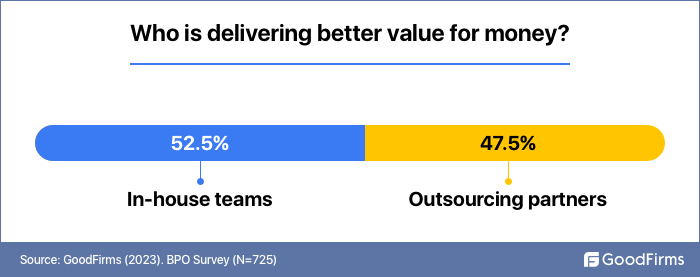
Having a balance between in-house expertise and outsourced services is important for businesses as it allows them to leverage the strengths of both approaches.
- In-house expertise provides businesses with a core team of experienced professionals who can provide guidance and oversight, ensure quality control, and maintain the business's daily operations.
- Outsourcing provides businesses with access to specialized skills, technology, and resources that can help them scale their operations and optimize their processes.
“It's important to have a balance between in-house expertise and outsourced services. A handful of in-house experts can provide crucial direction and oversight, while outsourcing can help you scale and optimize your operations,” says Mark Good, CEO Golden Gorilla Media.
For example, a business may have an in-house team of software developers who are responsible for building and maintaining their core software application. However, the business may choose to outsource some of the more specialized development work, such as cloud integration, to a managed IT service provider.
Similarly, a business may have an in-house team of marketing professionals who are responsible for developing and executing its overall marketing strategy. However, the business may choose to outsource some of the more specialized marketing functions, such as SEO optimization and DMCA certifications, to a third-party provider.
This approach can help businesses remain competitive, agile, and adaptable in today's rapidly changing business environment.
#7 Increasing Robotic Process Automation (RPA) in the BPO Landscape
RPA capabilities are becoming one of the most crucial considerations for selecting an outsourcing vendor. As the BPO industry progresses, service providers who adopt RPA technology early on stand to gain significant advantages from this growing trend. RPA has the potential to significantly lower costs, which was the primary driving force behind the outsourcing industry's growth. As a result, RPA is causing changes in the pricing models of both the ITO and BPO sectors.
“The BPO industry is rapidly adopting automation technologies. RPA and AI are being used to streamline processes and improve efficiency,” says Richard Chan, Founder & CEO of Coverright.
The Future of Business Process Outsourcing
“The future of outsourcing lies in creating long-term partnerships between companies and providers to ensure the highest quality of service. This will ultimately lead to improved customer satisfaction and increased profits,” says Jessica Carrell, Co-Founder, AnySoftwareTools.
Service providers are increasingly adopting a more strategic approach, changing their perception from being mere vendors to becoming transformative partners.
The future of the BPO industry seems bright. One of the main drivers for BPOs in the future will be the changing geopolitical dynamics. Hitherto, China, India, Taiwan, and the Philippines have been popular destinations for BPOs due to their large pool of skilled workers and favorable cost structures. However, geopolitical risks such as political instability, border conflicts, pandemic resurgences, etc., have impacted the attractiveness of a few of these outsourcing destinations. As a result, companies are exploring new venues for BPOs that offer similar advantages in terms of talent and cost but with lower geopolitical risks.
Also, the future will witness the emergence of new venues for BPOs. It reflects the dynamic and evolving nature of the outsourcing industry. For instance, the rising trends in mobility analytics, such as Telematics in vehicles, are creating new work types for the BPO industry.
"By using sensor data, traffic flow can be made more efficient, and accidents and traffic jams can be avoided. These innovations will make it possible for the BPO industry to grow in a number of ways. For example, it will be able to provide municipal services like processing data from mobility sensor devices that track the habits of commuters and many others. This is a massive market, and the BPO industry is well-positioned for growth in this sector," says Joe Troyer, CEO & Head of Growth, Digital Triggers.
Cost Will No longer Be the Differentiator
With the advancement of software robots, many processes are likely to become automated, which could lead to outsourcing companies losing their cost advantage since robots are cheaper to operate. This will force such companies to shift their focus from cost to high-end and diversified services.
“Business process outsourcing will become increasingly tailored to the specific needs of customers, necessitating the expansion of the business process outsourcing industry beyond pure service providers into suppliers with a broader range of capabilities,” says Michael Hess, eCommerce Strategy Lead, Code Signing Store.
Key Findings
- 55.6% of businesses outsource their business processes while 18.5% of surveyed organizations are in the initiating stage
- 44.4% of businesses reported offshoring their business processes
- 32.1% of businesses reported nearshoring their business processes
- 17.6% of businesses reported onshoring their business processes
- 41.5% of surveyed businesses stated they outsource their accounting requirements
- 30.6% of surveyees outsource their marketing needs
- 24.7% of surveyed businesses have outsourced their IT management needs
- 22.3% of surveyed businesses have liaisons with RPO service providers for their human resource requirements
- 19.2% of surveyed businesses have outsourced their customer service department
- 75.5% of surveyees choose to outsource business services to increase productivity
- 62.1% of businesses outsource their business functions to reduce operational complexity
- 58.3% of businesses outsource to gain access to quality resources and services
- 81.5% of businesses consider the experience of the outsourcing service provider before selecting one
- 74.6% of businesses consider pricing before finalizing outsourcing service partners
- 69.5% of surveyed businesses mentioned their processes have become faster after outsourcing
- 66.8% of surveyed organizations say they can now serve 24/7
- 59.5% of surveyed businesses assert their overhead costs have decreased
- 73.3% of surveyees are concerned about losing control over business processes
- 71.2% have concerns related to their competitors liaising with their outsourcing partner
- 66.6% of surveyed businesses reported a sudden increase in prices by an outsourcing partner as a major concern in outsourcing
- The shift towards omnichannel in BPO (business process outsourcing)
- There is an ongoing talent war in the BPO Industry
- Businesses now involve BPO partners in strategic decisions
- There is an increasing focus on appropriate outsourcing models
- The demand for specialized outsourcing services is rising.
- Companies are creating a balance between in-house employees and outsourced teams
- The world is witnessing increasing robotic process automation in the BPO landscape.
- High-end and diversified services will replace cost as a key differentiating factor in selecting BPO providers.
Conclusion
Organizations across the world are experiencing unparalleled changes and disruptions that are affecting their markets, products, and services. The need to undergo digital transformation and innovation is putting pressure on them, leading to the revision of their operating models. In response to the challenges posed by these disruptions, companies are using their outsourcing relationships as a catalyst to enhance their ability to adapt to change and meet their business objectives.
Companies are exploring new destinations and working with new providers to find the best fit for their specific needs and goals, while outsourcing providers are leveraging new technologies and delivery models to deliver specialized and high-quality services.
We sincerely thank our Research Partners for their valuable insights.
References
- https://www.grandviewresearch.com/industry-analysis/business-process-outsourcing-bpo-market
- https://www.pwc.com/gx/en/operations-consulting-services/pdf/outsourcingcomesofage.pdf
- https://www.cio.com/article/272355/outsourcing-outsourcing-definition-and-solutions.html
- https://www.apple.com/newsroom/2016/11/designed-by-apple-in-california-chronicles-20-years-of-apple-design/
- https://www.mckinsey.com/capabilities/operations/our-insights/getting-business-process-outsourcing-right-in-a-digital-future
- https://www2.deloitte.com/content/dam/Deloitte/us/Documents/process-and-operations/us-global-outsourcing-survey-2022.pdf
- https://dictionary.apa.org/ringelmann-effect
- https://www.businessinsider.in/tech/ibm-sued-over-1-billion-project-that-led-to-it-being-banned-by-queensland-australia/articleshow/26983732.cms
- https://www.researchgate.net/publication/4913935_Complexity_of_Outsourcing_Contracts_and_Ex_Post_Transaction_Costs_An_Empirical_Investigation
- https://www.smh.com.au/business/navitaire-and-virgin-blue-settle-20110404-1cyla.html
- https://www.cio.com/article/201936/4-lessons-from-the-hertz-vs-accenture-it-disaster.html
- https://www.sciencedirect.com/science/article/pii/S1877042815012999
Survey Participant Demographics:
Type of Business:
- Start up-13.6%
- Small-38.9%
- Medium-25.4%
- Large-22.1%
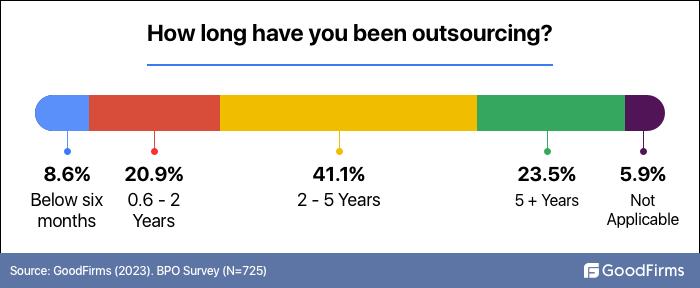
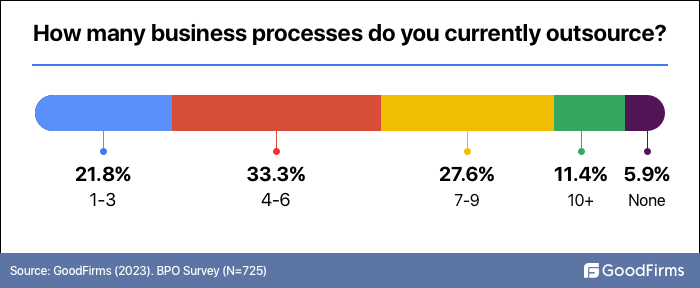
Table of contents
- Introduction
- Survey and Data Analysis
- Key Reasons for Outsourcing Business Services
- Top Factors in Choosing a Particular Service Provider
- Benefits Organizations Have Achieved after Outsourcing their Business Processes
- Major Concerns in Outsourcing Business Processes
- Current Trends in the Business Process Outsourcing Field
- The Future of Business Process Outsourcing
- Key Findings









